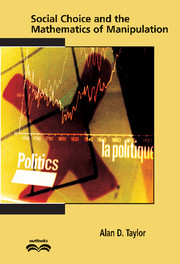6 - Ultrafilters and the Infinite
Published online by Cambridge University Press: 07 December 2009
Summary
The Infinite Version of Arrow's Theorem
In many ways, Arrow's theorem is mathematically more natural in the context of infinitely many voters than it is in the context of finitely many voters. For example, with infinitely many voters, one is led to the conclusion of Arrow's theorem with no feeling of impending paradox, the disquieting nature of the result only revealing itself in the corollary pertaining to the finite.
Throughout this section, we work with an arbitrary, perhaps infinite, set N of voters and an arbitrary, again perhaps infinite, set A of three or more alternatives. Our focus is on the social welfare version of Arrow's theorem, and we assume for simplicity that we are in the context of linear ballots.
Our starting point is Condorcet's original intuition that aggregation procedures with three or more alternatives should take advantage of the fact that voting with two alternatives presents few problems. Condorcet's voting rule (wherein an alternative is a unique winner iff it can defeat every other alternative in a one-on-one contest) is certainly inspired by this intuition. Moreover, with social welfare functions, there is an obvious kinship between this intuition and the desire to have the property of independence of irrelevant alternatives satisfied.
So let us begin with an imprecise description – the imprecision located by the quotation marks – of a social welfare function based on Condorcet's intuition and see where it leads us.
- Type
- Chapter
- Information
- Social Choice and the Mathematics of Manipulation , pp. 118 - 130Publisher: Cambridge University PressPrint publication year: 2005



